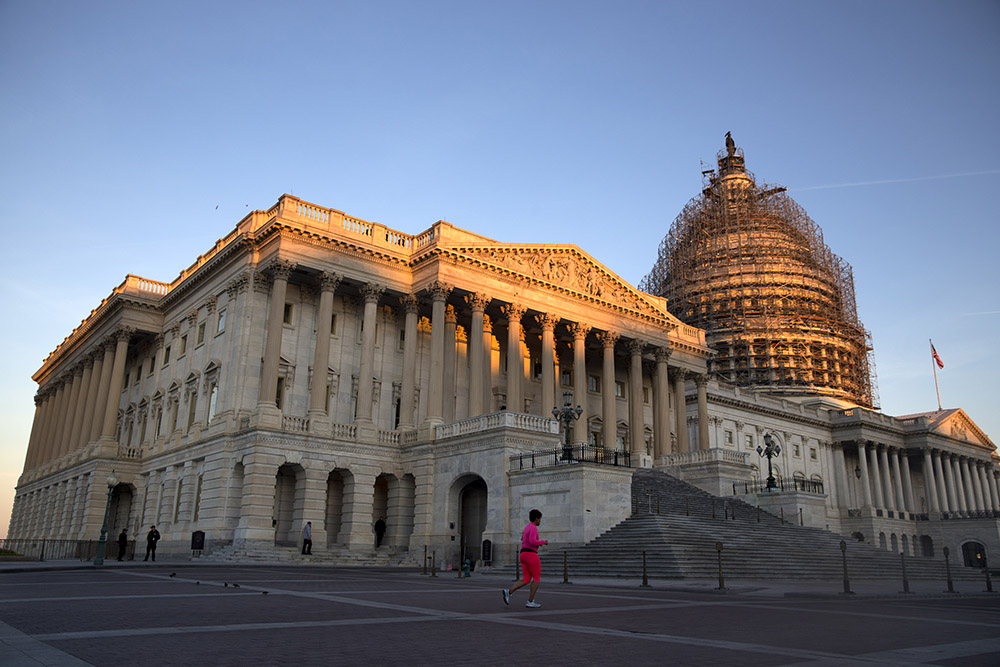Republicans can’t wait to retake the White House and unleash a bold, new conservative agenda. But even if they can defeat Hillary Clinton, their plans risk being thwarted by a divided Congress, an extended fight over the Supreme Court and key fiscal deadlines that will hit in early 2017.
Donald Trump and Ted Cruz are promising a sea change if elected, while Clinton is framing herself as the continuity candidate who will build on the work President Obama started.
If Republicans can convince the electorate that it’s their turn, their ability to do what they want to do will depend in large part on how the Senate turns out, which will depend on the name at the top of the ticket. If Trump or Cruz are the nominee, Democrats think they’ll have a chance at winning back control of the Senate, and would no doubt use their majority to stifle any aggressive new agenda.
“With Republicans in disarray and the party flirting with selecting a weak general election nominee, the benefit of the doubt has shifted away from the GOP and to the Democrats,” Stuart Rothenberg, a longtime campaign analyst, recently wrote about the Senate contests.
If the Senate flips to the Democrats, a new Republican president will likely find himself stymied by the upper chamber, making it impossible to do things like repealing Obamacare, a goal conservative voters have been craving for years.
Control of that chamber will also be pivotal in replacing Supreme Court Justice Antonin Scalia. Trump has already floated two names to fill the vacancy — Bill Pryor Jr. and Diane Sykes — conservatives opposed to abortion and Democrat-backed voter rights.

The death of Justice Antonin Scalia left a vacancy on the Supreme Court that will most likely be filled by President Obama’s successor. (AP)
Usually, elections have consequences when it comes to a president’s Supreme Court nominees, but there’s no guarantee next year. Republicans are ignoring Obama’s pick now, so Democrats already are vowing to fight tooth-and-nail against any GOP nominee, regardless of whether they win back the Senate.
On the flipside, Clinton would likely face the same problem were she to win the White House and the GOP keeps the Senate. In that case, the GOP majority will undoubtedly put her first high court nominee through the paces, and continue to do so with the three additional vacancies on the bench that are expected to follow.
Obama recently upped the ante in the Supreme Court fight by saying it’s “inconceivable” that Senate Democrats would allow a Republican president and Senate to push through a high court judge next year, after the GOP blocked his nomination this year.
“Let’s say from their perspective, everything works out great, and their nominee, whoever that might be, wins, and takes over the White House, and then they make an appointment,” Obama said of the Republicans during a visit to his alma mater, the University of Chicago’s law school in early April.
“The notion that Democrats would then say, ‘Oh, well, we’ll just go along with that,’ that is inconceivable,” Obama said. “So now, the Democrats say, ‘You know, what’s good for the goose is good for the gander. We’re blocking, we’ll wait four more years to see how the next president comes in.'”
The Supreme Court nominee is just one of the main issues the next president will need to address during his, or her, first 100 days. While it’s an arbitrary number, candidates use 100 days as a bench mark to set their agenda early on, during the honeymoon period traditionally granted to new presidents.
But a divided Congress and a pending fiscal throwdown probably means that the well-crafted 100-day plan that those candidates are touting right now will end up crumpled on the Oval Office floor.
Debt ceiling
Regardless of who controls the House and Senate, the congressional schedule will most likely roll a grenade into the next president’s first 100 days, as the White House will be forced to confront some key fiscal issues almost immediately.
Chief among these is the debt-ceiling fight that’s already brewing in Congress. In mid-March of next year, the suspension of the debt ceiling will end, and the U.S. government will automatically bump up against the new ceiling, estimated to be about $20 trillion.

“If it’s Hillary Clinton, it’ll be a knock-down, drag-out because Republicans will have the House and I hope the Senate,” said Americans for Tax Reform president Grover Norquist. (AP)
That will put immediate pressure on the new administration to use “extraordinary measures” to manage the national debt until it can work out some new agreement on the debt and the debt ceiling.
A Republican president working with a GOP-controlled Congress could easily avoid some messy fiscal fights early on, but if Clinton wins in November, all bets are off.
“If it’s Hillary Clinton, it’ll be a knock-down, drag-out because Republicans will have the House and I hope the Senate,” said Americans for Tax Reform president Grover Norquist.
Clinton could avoid an immediate fight by agreeing to cut the capital gains tax in order to promote growth while trying to convince Republicans to agree to more spending, Norquist said.
“I always thought that would be a smart way for a Dem — that’s not a deal that Obama was capable of doing although her husband did do it in 1997. Did she turn into Obama and Bernie Sanders or, is she still at heart a proponent of ‘let’s cut a deal?'” he asked. “I think she’s more hard left now after eight years of Obama driving the Democratic Party to the left.”
The GOP fight with Obama over the 2011 debt-ceiling agreement resulted in sequestration, which were 10 years of caps on discretionary spending.
By contrast, Cruz’s past could come back to haunt him as he tries to move from conservative bomb-thrower to the more difficult task of governing. He put the GOP leadership in a tough spot by taking a hard stand against extending the country’s credit line in February 2014, when he tried to filibuster the issue even as Republicans joined with Democrats to cut it off.
The unavoidable debt-ceiling battle would be an early test of Trump’s self-proclaimed negotiating skills, especially if Democrats retake the Senate.
“A number of us understand that we’ve got to have a real plan to balance [the budget] over time,” Rep. Mark Meadows, R-N.C., whose rare motion to depose House Speaker John Boehner expedited the top leader’s decision to retire, told the Washington Examiner. “What most Americans lack is a trust in that we will do what we say we’ll do. That’s going to be paramount in the first 100 days, that we not only put forth a bold vision but an action plan and stay with it going forward.”
Chance for accomplishments
Things get much easier if Republicans manage to hang on to both Houses of Congress, which would give a GOP president a clear path to quickly push through a slew of top priorities.
Under such a scenario, conservative groups already are pressing to make a first year count just like Democrats did when they controlled the majority in both houses of Congress and the White House in 2009.
“Even though Obamacare took until March of 2010 to sign into law, they accomplished a whole lot,” said Dan Holler, a spokesman and Capitol Hill point man for Heritage Action for America.
Passing a bill repealing Obamacare in the first 100 days would “go a long way to signaling there is a reason why people came out and voted for Republicans and will give assurances that they are going to deliver on those promises,” Holler said.

Repealing Obamacare would “go a long way to signaling there is a reason why people came out and voted for Republicans and [prove] they are going to deliver on those promises.” (Bloomberg)
Norquist said a Republican president also would be wise to rapidly push through the “Ryan Roadmap for America.”
The plan, originally written by Paul Ryan when he was House Budget Committee chairman, includes repealing and replacing Obamacare with a private-sector solution, major tax and entitlement overhauls, energy-sector deregulation and unwinding Obama’s executive actions.
“Because Republicans have repeatedly voted in the House to do this already, it’s not one of these things like Reagan’s tax cuts that didn’t pass until September [of his first year in office],” Norquist said. “… These guys have all done this before.”
Meanwhile, Clinton has vowed to build on the Affordable Care Act by decreasing the out-of-pocket costs and putting a cap on prescription drug prices.
“I want to build on [Obamacare] by looking for ways that we can put the prescription drug business and the health insurance company business on a more stable platform that doesn’t take too much money out of the pockets of hard-working Americans,” she said during a January Democratic primary debate.
Just days before the Nevada primary, Clinton also has said she plans to try to push through immigration reform that includes a path to citizenship in her first few months in office.
“This is at the top of my list,” she said of the immigration overhaul during an MSNBC/Telemundo town hall in February. She promised to introduce her version of an immigration overhaul to Congress in one of her first moves and to “work as hard as I can” to make sure it moves through the congressional process.
“I can control the introduction of legislation, but Congress has to get its act in gear,” she said. “That’s why we need to elect a Democratic Senate, so we have some friends.”
A GOP president would also be able to overturn Obama’s immigration executive action with the a stroke of the pen, instantly putting millions of people living in the legal shadows on notice they could be forcibly removed from the country.
“If you live by the pen, you die by the pen,” Cruz has said about Obama’s avid use of executive power during his final years in office. “Everything put in place by executive order can be undone by executive order.”
Cruz also said one of his reasons for running is to get a “mandate from the electorate” to push extensive tax and regulatory reform with the goal of eliminating the IRS and replacing the complicated U.S. tax code with a flat tax.
“The system is really collapsing under the weight of its own complexity,” said Pete Sepp, president of the National Taxpayers Union, whose organization estimates that it costs Americans $240 billion in lost time, energy and lost economic opportunities to comply with the tax code.
But even in a favorable political climate, other Republican immigration campaign promises would likely take longer to achieve.

The next president will have the power to continue, or completely undo, the executive orders of President Obama. (AP)
The two leading Republicans running have vowed to strengthen the southern border, and Trump wants to build a continuous wall, although getting Mexico to pay seems likely to require bilateral negotiations that could stretch on, if they’re ever successful.
Other foreign policy goals also would face complications. Cruz and Trump have said they would overturn the Iran deal as one of their first moves in office, but in reality, rebuilding the crushing sanctions regime that previously existed against Tehran is impossible without help from Europe and other major international players.
“I agree with the policy, but I do wonder if it’s too late [to undo the deal],” said Phillip Lohaus, a national security expert at the American Enterprise Institute. “A lot of the sanctions have already been lifted, and even though businesses are moving slowly into that space in terms of company investment, that’s not true of the Europeans.”
“It’s almost like the Pandora’s Box has already been lifted,” he said.
Presidents Trump, Cruz and Clinton also would likely proceed slowly in Syria where they would need fresh assessments from a newly assembled national security team before changing the limited airstrike course Obama has set.
Despite his promise to deploy up to 30,000 American troops in the Middle East to defeat the Islamic State, Trump has hedged when asked exactly how he would solve Syria’s civil war or step up the air campaign against the Islamic State in Syria and Iraq without incurring more civilian deaths.
And Trump’s temporary ban on Muslims entering the United States could provoke a legal challenge, so he’s more likely to wait for a more Trump-friendly Supreme Court.
In December, Clinton called for stepped up U.S.-led operations to defeat the Islamic State, going beyond what Obama has conducted so far by urging a no-fly zone with coalition forces to protect Syrians, more airstrikes and an expanded deployment of special operators to help vetted rebels.
More recently, however, she has muted her message on Syria, as Sanders has hit her from the left on her vote to go to war in Iraq, and Obama called his failure to prepare for the aftermath of regime change in Libya the biggest mistake of his presidency, implicating Clinton, his secretary of state at the time who supported ousting Moammar Gadhafi, in the process.
“If you asked me six or seven months ago, I would have said, yes, I expect her to take a much more hawkish stance [than Obama],” Lohaus said. “It’s more difficult to say now. She has really changed her tune a lot on the campaign trail.”
